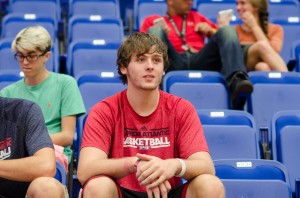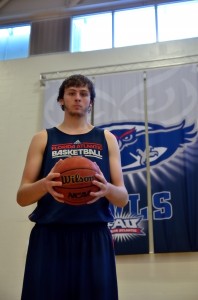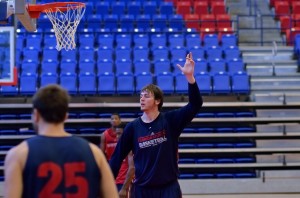
It’s a Saturday night in early October at The Burrow. Basketball season is a little over a month away but one of the Owls new big men is here to watch volleyball. Looking around, the atmosphere for a volleyball game at The Burrow is much different than for basketball.
Example: Only one side of the stands is used for seating at matches.
This made it easy to spot my target.
However, it wasn’t hard to identify a basketball giant in a crowd of 50 regular-sized humans. FAU center Dragan Sekelja, wearing a red FAU basketball T-shirt, black shorts and grey Nike’s with long white socks, is sitting alone three rows from the court to support his girlfriend, right side player Chandler Hatton. FAU, losers of their first nine conference games this season, are taking on Sun Belt foe Louisiana Lafayette.
The 7-foot Croatian’s long legs are scrunched up in his seat. Knowing that no one else is going to show up, he decides to stretch his size 15 kicks out over an empty blue chair in the row in front of him.
“I try to come to all the games I can, depending on my schedule,” Sekelja says.
That schedule is now basketball-intensive. While his teammates were struggling through an 11-19 season, the transfer from Baylor had to sit out all of last season as a redshirt. He explains how he learned a lot from the bench, but is glad the experience is over.
“That was probably the hardest thing I had to do in my basketball career,” Sekelja said. “Knowing I couldn’t help the team when I knew they could really use me was tough. It was frustrating.”
Right now, Sekelja is frustrated with the match and isn’t afraid to show his displeasure. FAU is about to drop their second straight set of the match.
“The refs don’t like us man,” Sekelja says after a call he felt went against the Owls. “The girl touched the ball and it went outside but they got the point. That’s not fair.”
***
Life can be unfair. When he arrived at Baylor in 2009, Sekelja thought he would have a prominent role on the team.
Instead, he played 79 total minutes in two seasons. When he actually did play, he wasn’t called on to produce.
“Coach just wanted me to be a dump center. Just set picks and not do much,” Sekelja says. “He took a lot away from my game and didn’t let me shoot at all. I didn’t have the ball at all.”
The lack of playing time initially had Sekelja wondering if he made the right choice.

“When I was at Baylor sitting at the end of the bench, I never thought of quitting,” Sekelja says. “But at the same time, I was just kind of thinking ‘Maybe I’m just not good enough for this level.’”
His attitude remained positive after talking it over with some of his teammates and putting things in perspective.
“But then you would have a few good practices and kind of regain faith in yourself. You’ve got to stay confident all the time,” Sekelja says. “Great players never lose their confidence, even if they miss a shot they move on to the next play. So that’s how I’m trying to be.”
Plus, it was at Baylor where he learned about American cuisine. One of his first meals there was a burger from Whataburger, something he smiles back on.
“It was the first fast food joint that I went to. It was just amazing,” Sekelja says. “The Whataburger was the first place in America where I had a big heart attack burger.”
***
At halftime, a couple of his Owls teammates show up. He introduces me to Javier Lacunza (from Spain) and Jackson Trapp. A salsa song begins to blare through the speakers and Sekelja decides to get a dig in on the Spaniard.
“This is his jam,” Sekelja says. “I came to his house one day and he was dancing to this in a towel.”
Between swapping phones to laugh at memes, Sekelja and Lacunza are checking their Twitter pages.
“You see how many people retweeted me?” he asks Lacunza. “You don’t get any retweets. Hashtag losing!”
“This is like Twitter competition,” he says to me of the friendly rivalry.
Sekelja says he’s at 395 followers and wants to break the 400 mark.
“You gonna follow me?” he asks.
I tell him yes and he turns to Lacunza to tease him some more.
“Oh yeah! Another follower,” Sekelja says. “Hashtag winning!”
***

Sekelja is from Zagreb, the capital of Croatia. As of 2011, the city has a population of 792,875, which is significantly larger than Boca Raton (85,329), but he says the environment is nothing like the United States.
“The culture is very different. It’s much more laid back where I’m from,” Sekelja says. “Here, it’s very fast paced but I’ve gotten used to it.”
His father is a retired policeman, and his mother works with the government.
Sekelja has one brother back home, whom he Skypes often.
“He is brave to go to America on his own. He is kind, warm hearted, witty, maybe a little shy in some occasions,” his brother Josip says. “There are too many memories to have a favourite — we spent so much time side by side. I find my room too quiet now that he’s in America. He would turn every electronic device on, jump around the flat, he had his ‘mess’ everywhere.”
Sekelja misses his mom’s home cooking, especially her birthday cake.
“The thing that I miss the most now is having a cooked meal three times a day,” Sekelja says. “To go from three cooked meals a day to cooking for myself every day you kind of appreciate it a lot more.”
***
FAU, which lost their first two sets, are now rallying to even the match. The volleyball team’s biggest (literally) supporter has a rhetorical question:
“Why don’t we play like that the whole game?” Sekelja asks.
When Chandler Hatton meets a ULL player at the net and blocks away the ball for a point, Sekelja puts on his best PA voice.
“The lane is closed,” Sekelja said with a grin. “That’s what they say at our games.”
***
When you walk through campus at 7-feet tall, 240 pounds, stares and questions are bound to happen all the time. The most annoying question for Sekelja, “Do you play basketball?”
It’s taken awhile to get use to, but Sekelja isn’t bothered anymore when asked this.
“I’m kind of over it though. It’s been that way for the past five, six years of my life,” Sekelja says. “So now I make jokes out of it.”
Sekelja takes it all in stride. Sometimes he tells people he’s 5-foot-10 and plays on the swim team or plays soccer.
No one falls for it.
“If they get really pushy and say ‘Oh you’re really tall do you play basketball?’ I say ‘Oh you’re really short. Do you play minigolf?,” Sekelja says. “People get offended sometimes but they don’t really think about what it’s like when people always come up to you asking about your height.”
Sekelja’s height has led to some awkward, uncomfortable moments.
“I hate it. Every flight or drive that’s like more than an hour, my legs start cramping up and I have to stop to stretch a little bit. It’s just been terrible,” Sekelja says. “But I’ve learned how to get use to it. So I don’t really complain about it because me complaining about it isn’t going to help.”
***
To get some responsibility and to kill time, Sekelja started working at the FAU Rec Center last year. It’s the way he got to work that’s interesting, though.
The 7-footer rides around on a normal sized scooter, causing stares and laughs from students.
“You will see him around Boca driving his scooter. A giant guy on a scooter,’’ teammate Pablo Bertone says while laughing. “People take pictures of him and stuff. I’ve been in the car with a friend. He didn’t know him and he was taking pictures of him.”
Sekelja bought the scooter for his birthday last January. His teammates teased him about it at first, but now they see the benefits.
“Every day I drive my scooter to practice. They make fun of me because it’s a regular sized scooter — two people can fit on it,” Sekelja says. “Sometimes I let them drive it and they like it. They’re like little kids in a candy store.”
He used to have a different form of transportation but realized a change was necessary.
“Just because it’s easy to get around campus, and I had a bike, but I realized I’m just a little too big for one,” Sekelja says of why he made the switch. “It’s more convenient and I was starting to work at the rec center so it helped me to get around.”
***
At the Rec Center, Sekelja worked at the front desk.
“He was a cool co-worker,” Clifford Coleman says. “Fun person to work with. He made the time go by fast.”
One of the ways Sekelja did that was by playing jokes on students.
“Say a girl will walk up while he was working. She’ll come up and ask “How tall are you?” He’ll say ‘Oh I’m 6’2,’” Coleman says. “And she’ll be like ‘Wow I’ve never seen somebody 6’2 before. You’re so tall.’ I’ll just be there standing like, ‘Oh my goodness, you can’t tell he’s 7-foot?’”
Sekelja discovered rap music while at Baylor from his teammates. Coleman was surprised when he found out one of Sekelja’s favorites.
“He’s a 7-footer. He’s from Europe. But yet he likes Lil Boosie,” Coleman says. “That shocked the heck out of me.”
Sekelja made even the most routine, mundane tasks like cleaning out lint from the washing machine seem interesting,
“Put it this way, Dragan has a little swagger about him,” Coleman says.“Whatever he does he tries to turn it around and make it seem like it’s a cool thing to do.”
Sekelja no longer works there, wanting to devote more time to basketball. However, his time at the Rec Center helped Sekelja form friendships that he hopes will carry on even after college.
“It was a great experience just because it was a family atmosphere around there. I became really good friends with people that I worked with,” Sekelja says. “There was not one single person I didn’t like over there. So every time I would go to work I would have a smile on my face. It was like business and pleasure at the same time.”
***
The game is down to the final play. FAU is looking to pull off the upset and now Dragan is on his feet. When FAU’s Alessia Pizzoccheri scores the final point ,Sekelja raises his hands to the sky in joy. The volleyball team huddles up in the middle of the court, shouting and high-fiving.
Dragan’s been to a ton of his girlfriend’s games but this is the first time he gets to celebrate a win with Hatton.
“He comes to support me every single game,” Hatton says. “He comes early, stays late and he has a blast. So it’s great.”
The win snaps a 23-match losing streak in Sun Belt play.
Sekelja mimics the swagger he think the team will have because of the victory.
“They’re going to be all cocky in the halls now,” Sekelja says to new forward Chris Bryant as he tilts his chin to the ceiling and struts like a peacock. “Oh, look at us we won a game.”
Chandler Hatton’s shoulder is covered with an ice pack but that doesn’t stop her from poking some fun at Sekelja.
“The UP shows up for a volleyball game and you get interviewed about basketball,” Hatton says while she play-boxes with him. “What’s that all about?”
It’s all smiles afterwards. Bryant says he’s ready to catch no-look passes from Sekelja, but doubts his skills on the dance floor.
“Dragan? Man Dragan ain’t got no rhythm,” Bryant says before offering a challenge. “Yo Dragan, let me see you Dougie.”
Out of respect, Sekelja declines to show the newcomer his funky moves.
“I can Dougie better than you,” Sekelja says as he palms a stray volleyball. “I just don’t want to embarrass you.”
***
So far, Sekelja and his head coach Mike Jarvis are on the same page. In Sekelja’s visit to FAU, Jarvis made him feel at ease by explaining what his role would be and that he puts God first before basketball.
“I can learn a lot from him. He’s coached many great centers, including Patrick Ewing,” Sekelja says. “I believe he can take my game to the next level. When I was here for my visit, coach told me he was going to be harder on me than anyone else and expect more from me than even I expect from myself.”
Part of that is learning to take criticism Mike Jarvis style. During one Friday scrimmage, point guard Stefan Moody drives the baseline and hits Sekelja with a pass in the paint. Instead of powering over 6-foot-6 Kelvin Penn, Sekelja decides to loft a soft layup that rolled off the rim.
Jarvis is fuming.
“Dragan!” he yells. “Dunk the ball!”
Jarvis sees the potential in Sekelja, which is why he won’t settle for less than excellence from his new man.
“The thing about Dragan, like any other player we have, no matter how well they do, we want better. The better he does, the more I’m going to push him and the more I’m going to expect of him,” Jarvis says. “That’s what any player should want. He wants to be a player. He wants to be a pro. I think he can be. But he’s still got a long way to go before he gets there. He’s still in a developmental stage.”
In the moment it may be difficult to deal with, but Sekelja knows there’s a method to Jarvis’s approach.
“Sometimes it’s tough, but I want to get better so I have to live with it. I’m coachable. I’m not going to take it to heart,” Sekelja says. “I don’t listen to the way he says it, I listen to what he says. As long as he’s talking to me I know he wants me to get better. If he’s not talking to me, then I’d be worried.”
Jarvis realizes how vital a potentially dominant center could be for his squad.
“He is a center. He is the guy that things revolve around. I expect him to be a very stable center,” Jarvis said. “He should be an integral part of holding the team together by being a real center. By being the center of our team. Not only doing well for himself but making sure everybody else is working.”
Teammates are thrilled for the advantages of Sekelja manning the middle.
“He’s going to help us a lot. He’s huge so he’s going to be like an obstacle they have to go through to get to the basket,” Pablo Bertone says. “On offense, everything starts through him. We can dump the ball in the paint and then he’ll kick the ball out and get everybody moving. It opens the floor up a lot.”
***
The moment is approaching.
Sekelja says every day he doesn’t leave the gym until he makes 500 18-foot shots. He cannot contain his excitement. Sekelja doesn’t know how the season is going to unfold but he just wants to get out on the court and play basketball again.
“I’ve been ready,” Sekelja says. “It’s been long. Too damn long.”



















